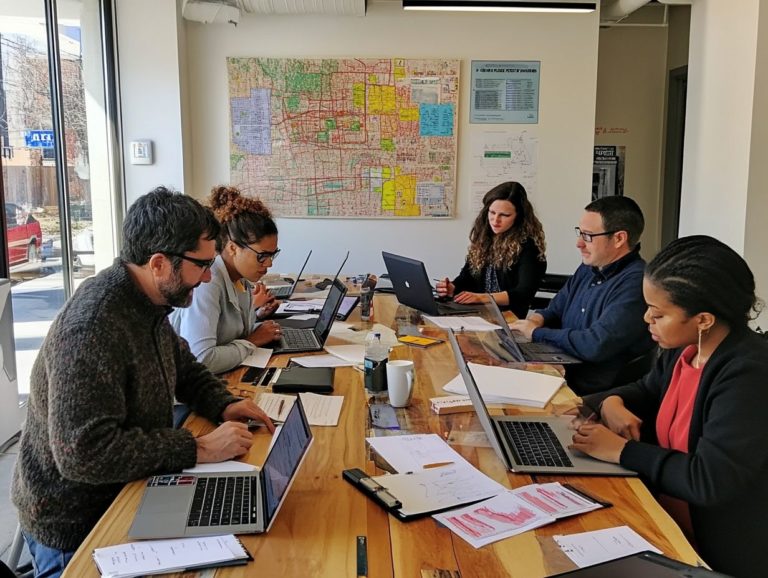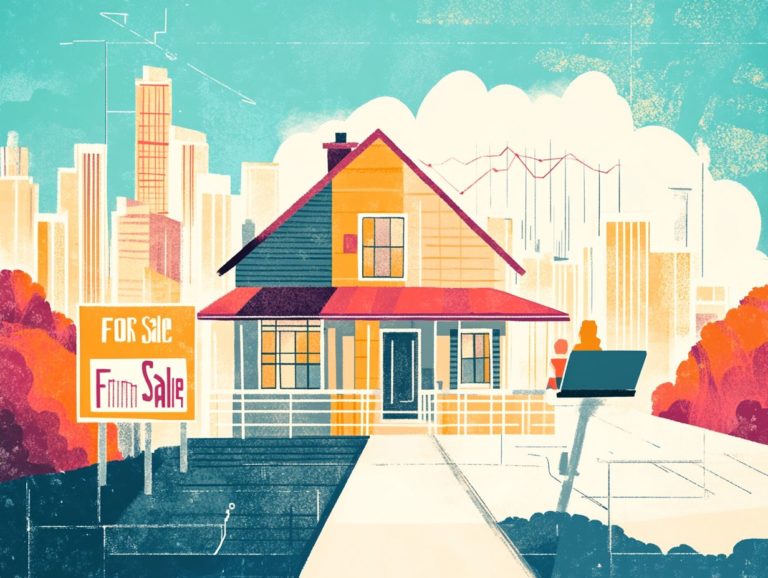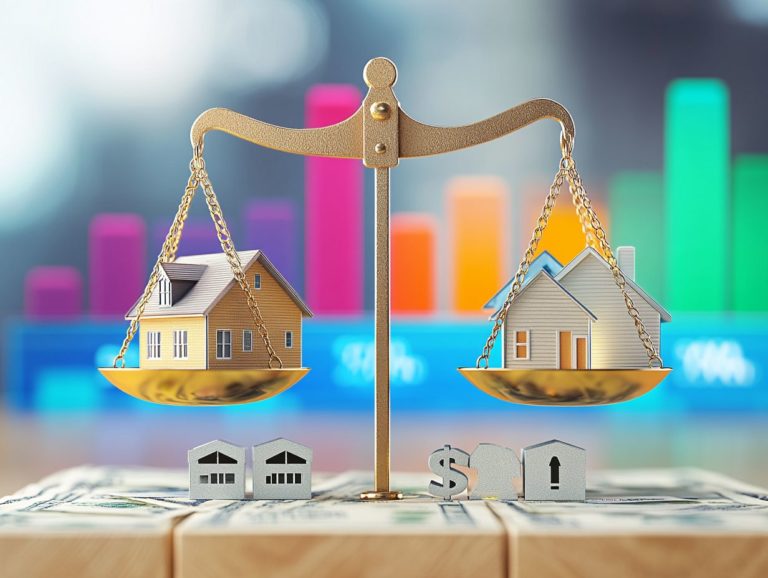Understanding the Rental vs. Buying Debate
Navigating the choice between renting and buying a home can feel like stepping into a labyrinth, with countless factors to consider. Each option presents unique advantages and disadvantages that can greatly influence your financial future and overall lifestyle.
This article explores the pros and cons of both renting and buying, providing you with valuable insights tailored to your circumstances. Whether you’re leaning towards the flexibility of renting or the prospect of building long-term value, you ll find the information necessary to make a smart choice.
Contents
Key Takeaways:
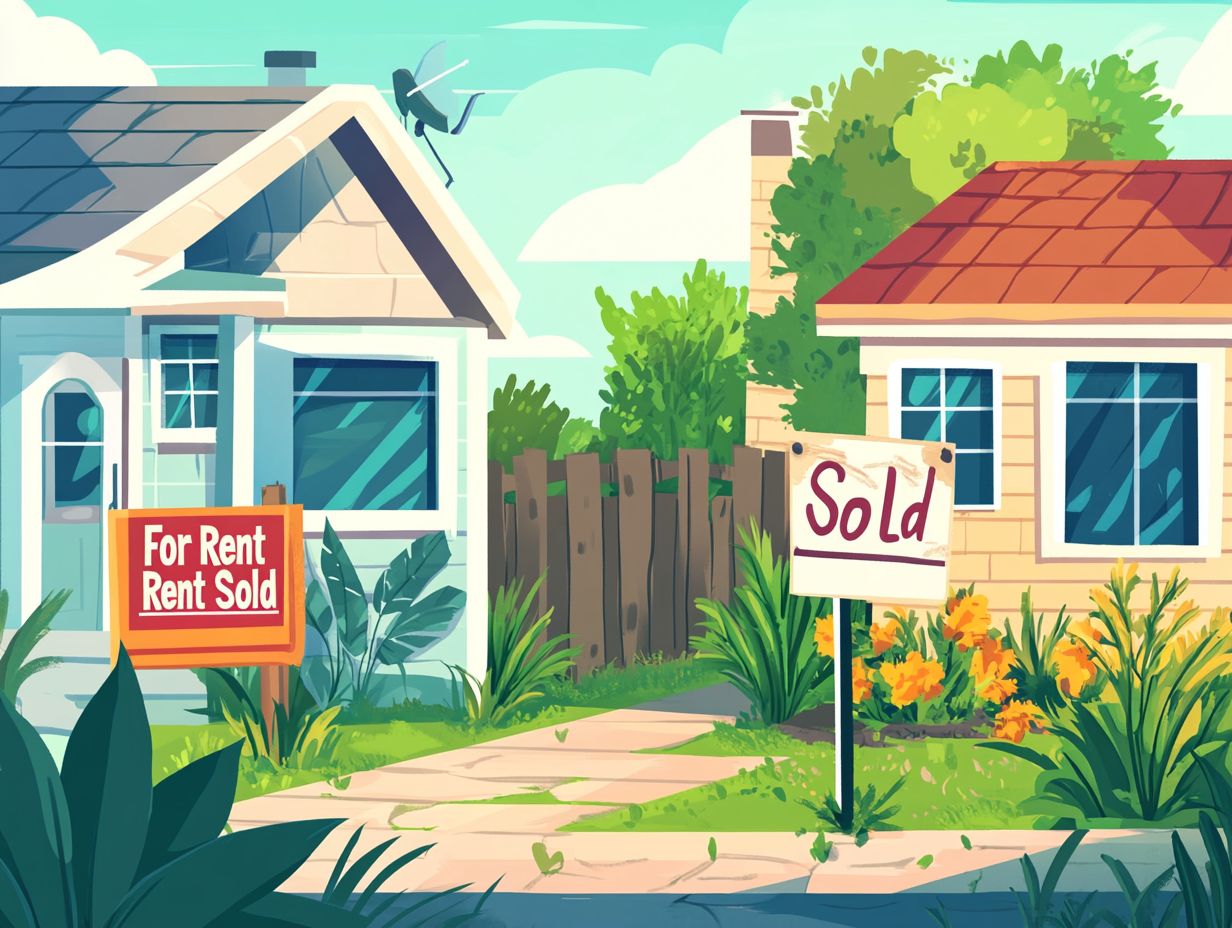
Renting allows for flexibility and lower upfront costs, but it lacks the potential for long-term investment and stability that comes with homeownership. Buying a home can provide financial stability and potential for appreciation, but it also comes with higher upfront costs and a long-term commitment. When deciding whether to rent or buy, consider your financial situation, lifestyle needs, and your long-term plans. There is no one-size-fits-all solution.
The Pros and Cons of Renting
When considering renting a house, it’s essential to assess your financial situation, lifestyle choices, and long-term goals.
Renting offers flexibility, allowing you to relocate with ease, free from the burdens of homeownership. It can also be a smart financial strategy, especially for those focused on building an emergency fund or reducing monthly expenses.
Understanding the differences between being a tenant and a landlord is vital for making a wise choice about your living arrangements and future investment opportunities.
Advantages of Renting
One major advantage of renting is the remarkable flexibility it provides. You can easily adapt to changing circumstances, whether it s a job relocation or shifts in your personal life. This adaptability is especially beneficial during transitional phases where committing to a property doesn t make sense.
Renting typically involves lower upfront costs compared to purchasing a home, making it appealing for those looking to preserve savings. As a renter, you re also relieved from property taxes, letting you allocate finances toward immediate needs or save for the future.
With limited maintenance responsibilities, you can enjoy peace of mind and focus more on your personal and professional aspirations. For anyone looking to maintain an emergency fund, renting fits well into short-term financial strategies, allowing you the freedom to save or invest as life unfolds.
Disadvantages of Renting
While renting has perks, it also presents disadvantages, such as the lack of home equity and limited control over your living space.
This lack of ownership can create uncertainty, especially when rental prices rise and landlords increase rates. You might find yourself unable to personalize your unit, as landlords typically impose strict rules about modifications. These restrictions can make it hard to truly feel at home.
The initial expense of a security deposit can also strain your finances, adding stress to the renting experience. Ultimately, by choosing to rent, you may face long-term financial implications, missing out on the chance to build equity the money you earn from your home when its value goes up.
The Pros and Cons of Buying
When deciding to buy a house, you must carefully weigh the pros and cons, considering factors like financial commitments, market trends, and the long-term potential of your investment.
For many, purchasing a home symbolizes the American dream, offering benefits like building equity and predictable monthly mortgage payments. However, this journey comes with responsibilities, including property taxes, maintenance costs, and the need for a substantial down payment.
Understanding these dynamics is crucial for anyone considering homeownership as a viable option for their housing needs.
Now that you ve explored the advantages and disadvantages of renting versus buying, take a moment to reflect on your own situation. Evaluate what option is right for you based on your needs and future plans!
Advantages of Buying
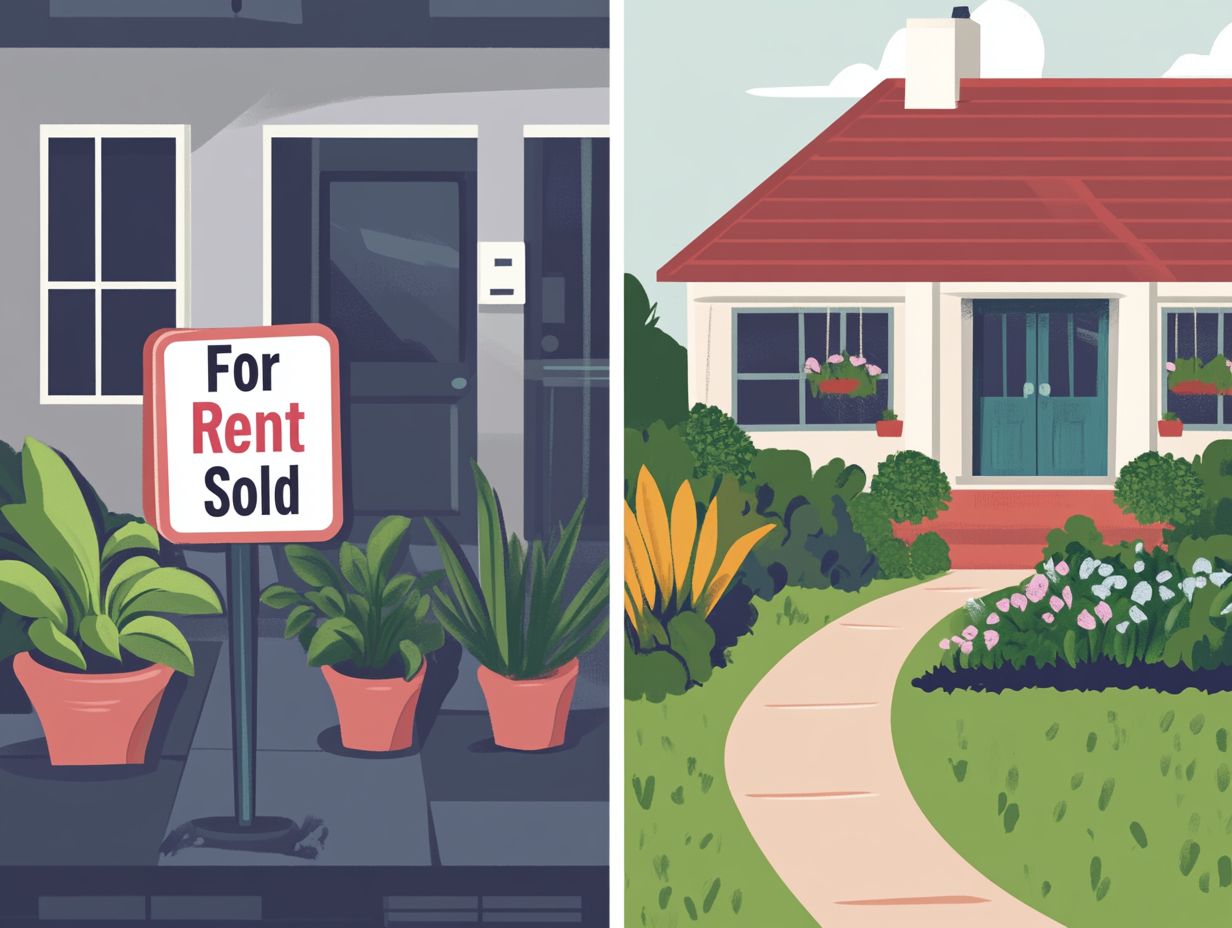
One of the most compelling advantages of purchasing a home is the chance to build home equity over time. This means the money you earn from your home can become a powerful financial asset!
As you navigate the real estate market, you’ll likely discover that your property’s value increases. This can offer you a significant return on your investment. The potential for continued growth enhances your financial portfolio and can lead to an increased net worth.
You can benefit from tax deductions on mortgage interest and property taxes, which increases your available income.
The predictability of fixed mortgage payments provides a vital sense of stability. This shields you from rising rents and contributes to a more secure long-term financial future.
Disadvantages of Buying
While buying a home has many benefits, you must recognize the notable disadvantages as well. You’ll face ongoing financial responsibilities like mortgage payments and property taxes.
Be prepared for unexpected costs related to repairs and maintenance. These can strain your budget, especially if you’re a first-time homeowner who has already invested a significant amount of savings into the down payment. This initial hurdle can limit your flexibility to pursue other investment opportunities and hinder your broader financial goals.
Fluctuations in the housing market can lead to diminished property values, complicating your long-term plans. Given all of this, thoroughly evaluate these potential downsides before making such a significant commitment.
Factors to Consider when Deciding to Rent or Buy
Deciding whether to rent or buy a house requires thoughtful evaluation. You must weigh your financial situation alongside your lifestyle preferences while keeping a keen eye on current market trends.
This decision is about aligning your goals with the realities of the housing landscape. Ensure that you make a choice that truly suits your needs and aspirations.
Financial Considerations
Financial considerations are paramount when weighing the choice between renting and buying a home. This involves evaluating mortgage payments, down payment requirements, and ongoing costs.
Assess your current financial health and future goals. As a potential homeowner, you might encounter significant upfront costs, such as closing fees and property taxes. These can be quite different from the typically lower initial expenses associated with renting.
Both options come with monthly obligations whether it s rent or mortgage payments, insurance, and maintenance costs.
Understanding how your credit score influences interest rates on mortgages is crucial. This can significantly impact your decision-making process. By building a robust financial plan that outlines these key elements, you can make informed and strategic choices about your housing situation.
Lifestyle Factors
Lifestyle factors play a crucial role in your decision to rent or buy, reflecting your personal preferences, career aspirations, and family dynamics.
If you value stability and long-term commitments, purchasing a home may provide you with a permanent foundation as you expand your family or advance your career.
However, if your job situation is fluid or you foresee frequent relocations, renting may align better with your lifestyle.
Considerations like family size and financial circumstances are pivotal. Larger families often need the extra space that homeownership affords, while smaller households may prefer the flexibility that rental agreements offer.
Striking a balance between stability and adaptability is essential when weighing your housing options.
Renting vs. Buying in Different Situations
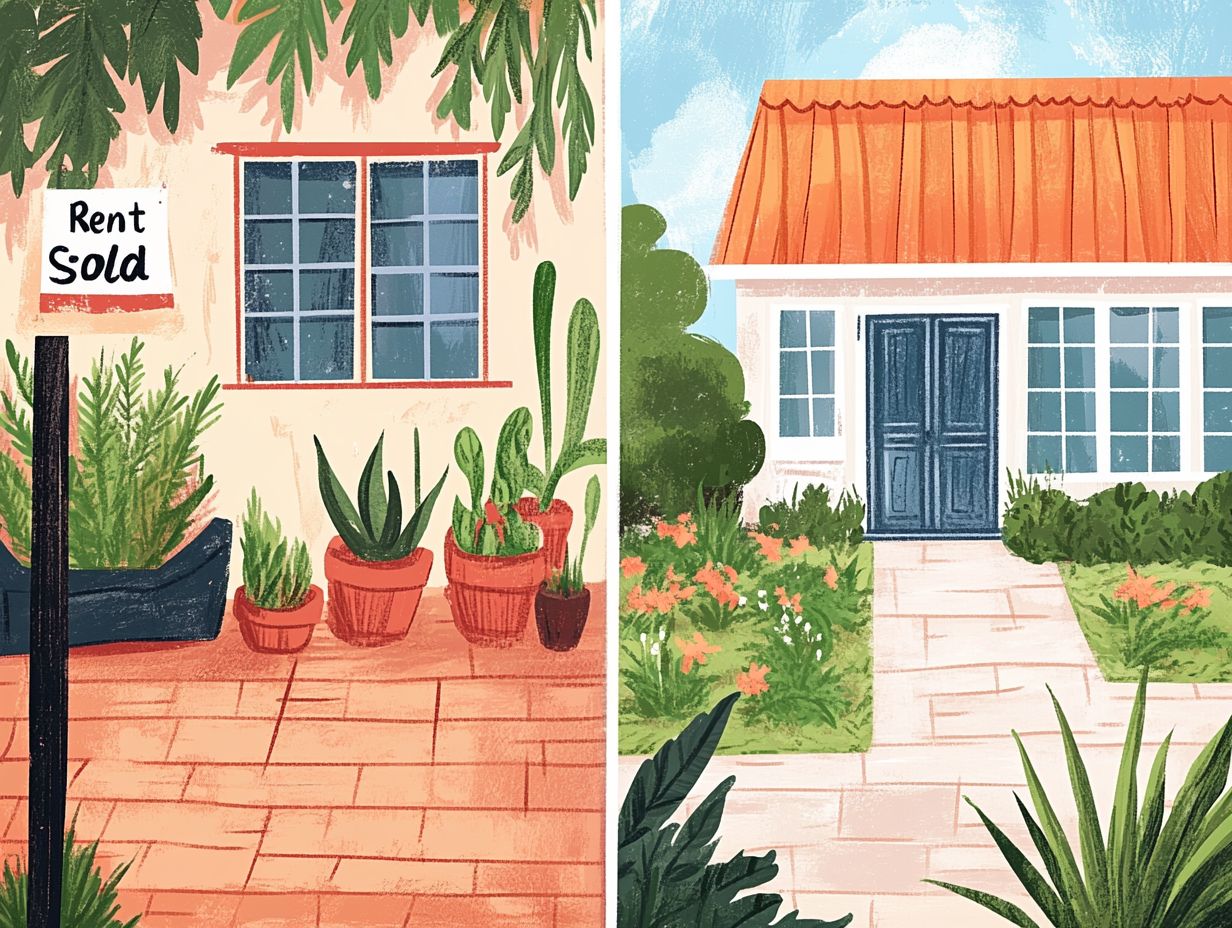
The choice between renting and buying can vary greatly depending on your unique situation. Factors such as your financial goals, lifestyle changes, and personal circumstances all play a crucial role in making this significant decision.
Evaluate your options today!
When Renting May Be Better
Renting can often be the ideal choice for those who value flexibility. This is especially true if you re managing short-term commitments or navigating an unpredictable job landscape.
For instance, professionals who frequently relocate for work find that renting allows them to easily adapt their living situations. They can avoid the added stress of selling a home.
If you re feeling uncertain about the housing market, renting might be the smarter move until you re ready to make a confident investment.
If you want to focus on travel, education, or starting a business, the lower financial commitment that renting offers can allow you to prioritize those enriching experiences while enjoying a comfortable living situation.
When Buying May Be Better
Buying a home can be a fantastic choice for those seeking long-term stability and a solid investment.
For families eager to put down roots, owning a home provides not just shelter but a sense of belonging. It creates a stable environment where children can thrive and develop connections within the community.
If you re planning to settle down in one location for several years, purchasing a property can yield significant financial benefits. This allows you to gradually build equity, turning your home into a valuable asset.
Over time, that investment transforms from a mere living space into a valuable asset, granting you the freedom to personalize your surroundings without the limitations often found in renting.
Frequently Asked Questions
- What is the rental vs. buying debate?
- The rental vs. buying debate compares the advantages and disadvantages of renting a property versus purchasing one. It is a commonly discussed topic among individuals seeking a place to live.
- What are the main factors to consider when deciding between renting and buying?
- The main factors include the current housing market, your financial situation, your long-term plans, and your personal preferences. These can greatly impact which option may be better for you.
- What are the advantages of renting a property?
- Renting offers flexibility in relocating and typically requires a lower upfront cost compared to buying. It also means no responsibility for maintenance and repairs, making it a good option for those unsure about their long-term plans.
- What are the advantages of buying a property?
- Buying offers long-term financial stability and the potential for wealth building. It allows you to customize and make changes to the property, providing a sense of ownership and stability.
- Is it always cheaper to rent than to buy?
- Not necessarily. In some areas, renting may be more expensive than a mortgage for a similar property. However, there are additional costs of owning a home, such as property taxes, insurance, and maintenance, that should be taken into account.
- What are some potential downsides of renting or buying?
- Potential downsides of renting include limited control over the property, the possibility of rent increases, and no guarantee of long-term housing. Conversely, buying comes with responsibilities for maintenance and repairs, a long-term mortgage commitment, and the risk of property value depreciation.
Don t wait deciding now can save you money in the long run! Assess your situation and determine which option is best for you. If you have questions, feel free to reach out for more information.


